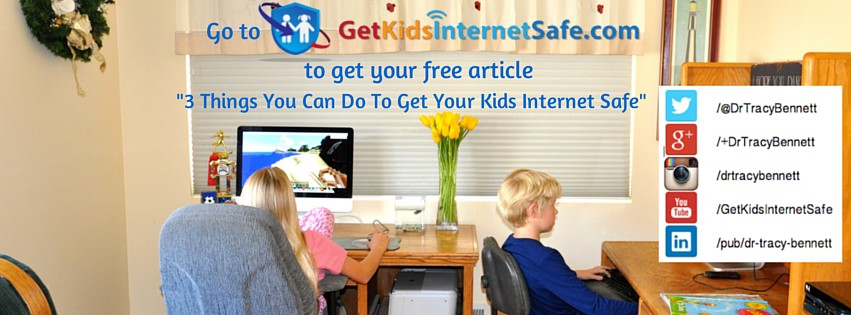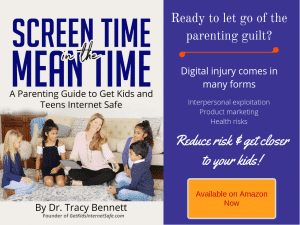
1 of a 3-Part Series Sensible GetKidsInternetSafe (GKIS) Screen Media Guidelines for Children Ages 3 to 6 Years
Preschool is a good time for children to start to develop technology skills, digital literacy, and digital citizenship. From my three-pillar experience as a mother, clinical psychologist, and university professor, I believe these guidelines will help get your family started on the right path to awesome parenting in the digital age. Of course, these are simply suggestions. As a parent, you can use your judgment and alter these guidelines to best fit your children and family.
Congratulations for going the extra mile to be an awesome parent right from the beginning, rather than waiting until your children have been exposed to damaging material or have developed dangerous habits. As little ones, they will readily accept your guidance, and your thought-thru, safe guidelines will smoothly become a way of life. If you wait to change things after bad habits have formed, kids often resist and become sneaky, resentful, and defiant. Take a second to give yourself a heart-full-of-self-love pat on the back for taking the extra time and going the extra mile for your little ones.
SET THE STAGE:
-
Fine-tune your technology skills, use patterns, and opinions about technology before your babies ever lay eyes on a media screen. This will allow you to be confident from the start that you have a well thought-out plan and already serve as a good role model.*
For example, recognize that by posting your children’s pictures on social media you are creating their digital footprint thatis permanent on the world wide web. Consider what you think is appropriate to post, and with what privacy settings, particularly given your child’s inability to provide informed consent. Baby pictures are one thing, but as your children mature so does their digital footprint. I personally choose to post with strict privacy settings on social media and tend not to include my grown kids’ images on public forums like www.GetKidsInternetSafe.com. Each parent must determine his/her own comfort level.
-
Become your child’s go-to expert by maintaining a fun and supportive dialogue about technology. Then, put it in writing!
As you gain knowledge from your discussions and research, create a GetKidsInternetSafe Family Agreement during a weekly family fun night.* Commit to a weekly 10-minute check-in to keep everybody compliant and incorporate improvements as you go. If kids are raised with sensible guidelines and consistent (but chill) follow-thru, they adapt easily and are more likely to adopt positive viewpoints and values.
-
Become an educated buyer and do your research BEFORE you purchase devices or software. Be cautious of unverifiable claims, especially by marketers promoting a product.
If by using the software your child is incentivized to BUY MORE, do yourself a favor and don’t buy it. Avoid manipulative neuromarketing techniques that target your fears and your children’s wants as much as possible.Consider initial and upgrade costs and safety and durability issues prior to making a purchase.
-
Consider how technology will interact with your child (burgeoning developmental abilities, unique strengths and vulnerabilities, and moods).
Parents often think kids will seek out what they need for health, as if they are pre-programmed to know (Hesketh). They aren’t and need your active guidance!
Just as there’s research of academic and prosocial benefits to appropriate screen media programming, there is also mounting research evidence of social, language, and reading delays due to TOO MUCH screen media use.
There’s also concern that screen media demonstrates brain stimulation patterns typically seen in addiction, perhaps setting the stage for attention and addiction issues later (Christakis, Sigman). Think of your child’s current as well as future development as you make your selections.
The soon-to-be-posted GetKidsInternetSafe crash developmental psychology course for 3 to 6 year-olds will help with this, so keep an eye out for it!
-
Stage your home and set sensible rules for smart technology use.
Place screens in family traffic areas, enforce a night-time docking station, no screen time before bed time, take breaks – 15 minute break after 45 minutes of screen viewing, and definitely no screens in the bedrooms.*
MOTIVATOR: Excessive screen media use by children has been linked to increased risk for obesity, increased sensitivity to stress, irritability, depression, impulsivity, aggression, decreased attention, motor problems, and sleep problems (Cristakis, Robinson, Schmidt, Swing).
-
Install protective software.
To prevent risk of viruses and hacking, install anti-virus, anti-spyware, and anti-spam security programs and a personal firewall. If you have no idea what I’m talking about, google it (e.g., “What is a firewall?”) I’ll have articles coming up on www. GetKidsInternetSafe.com with detailed instructions as well. Until then, there are excellent articles out there with reviews and recommendations. I say GO FOR IT!
Also install filtering and monitoring programs on any devices your child will be using.
IMPORTANT: Be honest with your child about your actions from the get-go.* Raising kids with a respectful and honest transparency about your efforts to keep them safe will go a long way in developing a cooperative and trusting alliance. If they know from the beginning that you are forever monitoring, they won’t feel stalked or ambushed later and be less likely to sneak. I tell my kids that I may check their media at any time for any reason (even though I don’t invade their privacy other than an occasional spot-check). If I see anything that concerns me, they are the first to know. Parents get into terrible violation of trust situations when they sneak peeks and hold secrets.
-
Provide age-appropriate devices and content and let your children experiment.
It’s best to provide warm support rather than micromanaging. Encourage mastery of technology basics (e.g., tech vocabulary and problem solving, essential commands, and how to use the browser), as well as fine motor skills (e.g., keyboarding, screen touch, and the mouse).
Don’t over do it, start out slow. There is little persuasive evidence that screen time will dramatically accelerate academic skills. Your kids will have plenty of time to develop those at school and with home reading and arithmetic activities integrated into the everyday. Be conservative and limit the screen media use. Face-to-face interaction and running in wide open spaces remains far superior for healthy development than hours of screen time.
I hope today’s article inspires you to proactively GetKidsInternetSafe in your home. GKIS articles are designed to give you the most essential technology and parenting information in a quick and easy-to-read format; and hopefully motivate you to think deeply, plan, reassess, and repair your technology plan along the way. Stay connected to GKIS and being your family’s expert will be easy! Please help me out and pass this information on to any friends or family you know with young children. Also, I would love for you to be generous with any genius stage-setting ideas you have stumbled upon in the comments section after this article.
To get the free article download “Three Things You Can Do to Get Your Kids Internet Safe,” click here.
I’m the mom psychologist who will help you GetYourKidsInternetSafe.
Onward to More Awesome Parenting,
Tracy S. Bennett, Ph.D.
Mom, Clinical Psychologist, CSUCI Adjunct Faculty
GetKidsInternetSafe.com
Works Cited
Christakis, D. A., F. J. Zimmerman, D. L. Digiuseppe, and C. A. McCarty. “Early Television Exposure and Subsequent Attentional Problems in Children.” Pediatrics 113.4 (2004): 708-13. Web.
Hesketh, Kylie D., Trina Hinkley, and Karen J. Campbell. “Children′s Physical Activity and Screen Time: Qualitative Comparison of Views of Parents of Infants and Preschool Children.” International Journal of Behavioral Nutrition and Physical Activity 9.1 (2012): 152. Web.
Robinson, T. N. “Reducing Childrens Television Viewing to Prevent Obesity: A Randomized Controlled.” JAMA 282 (1999): 1561-567. Web.
Schmidt, Marie Evans, Jess Haines, Ashley O’Brien, Julia McDonald, Sarah Price, Bettylou Sherry, and Elsie M. Taveras. “Systematic Review of Effective Strategies for Reducing Screen Time Among Young Children.” Obesity (2012). Web.
Sigman, A. “Time for a View on Screen Time.” Archives of Disease in Childhood 97.11 (2012): 935-42. Web.
Swing, E. L., D. A. Gentile, C. A. Anderson, and D. A. Walsh. “Television and Video Game Exposure and the Development of Attention Problems.” Pediatrics 126.2 (2010): 214-21. Web.
LOVING THESE TECHNOLOGY STATION IDEAS: http://www.pinterest.com/search/pins/?q=kids%20work%20stations
Don't worry, we will never spam you.










